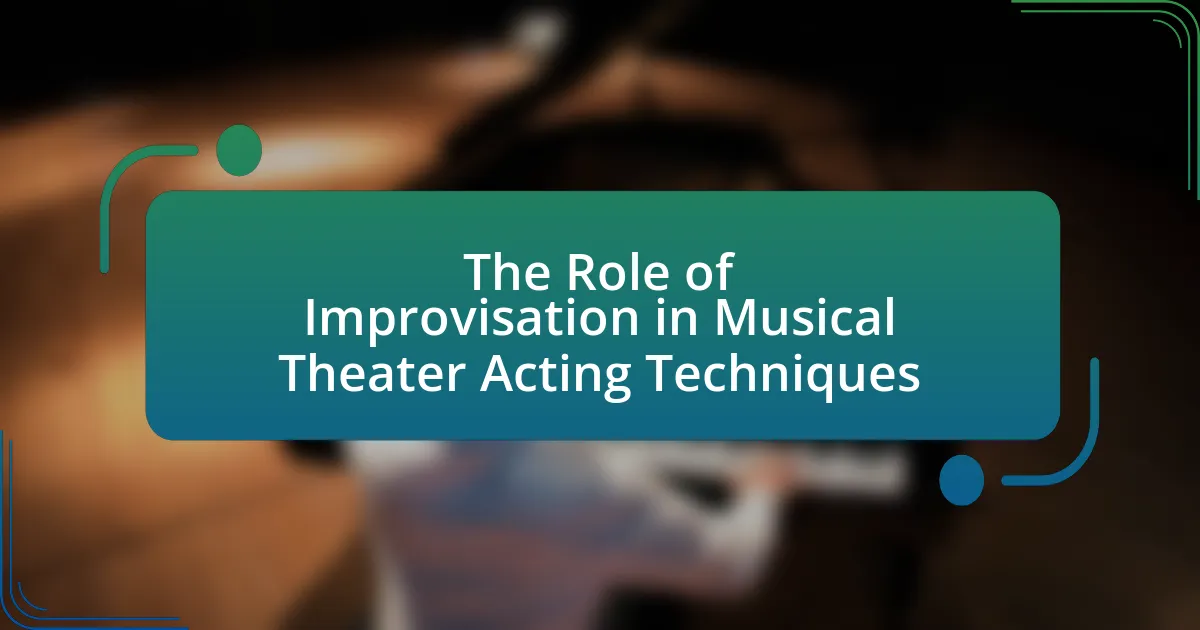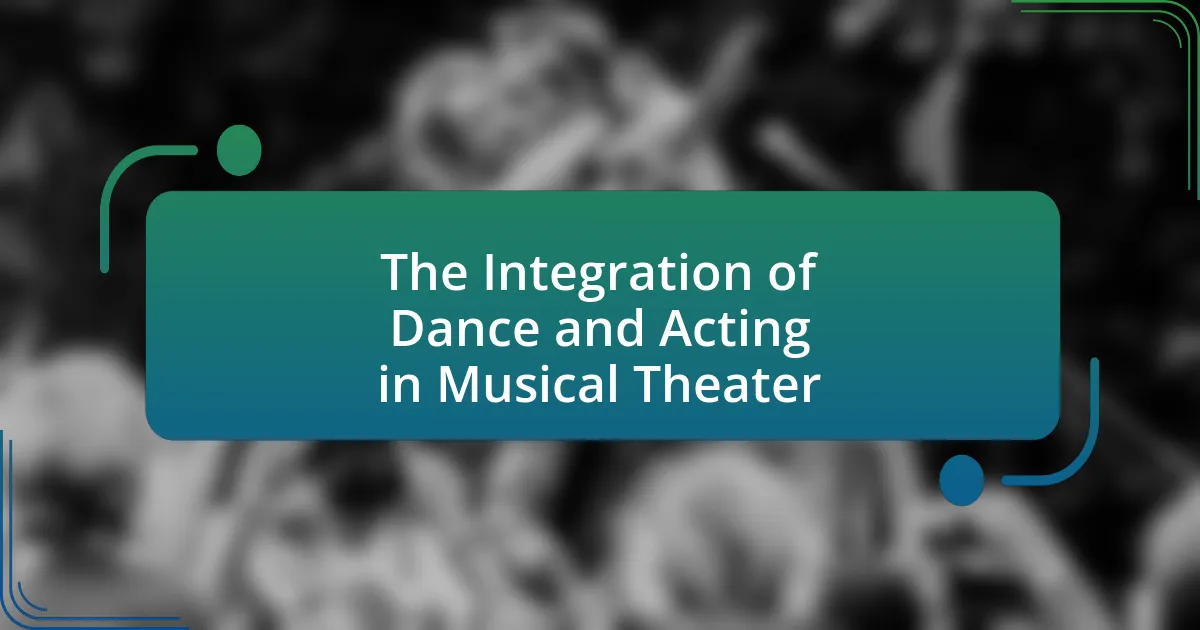The article focuses on effective strategies for auditioning in musical theater, emphasizing the importance of selecting appropriate material, thorough preparation, and showcasing versatility. Key components include the role of monologues and musical numbers in demonstrating an actor’s emotional range and vocal ability. It outlines effective types of monologues, techniques for selecting the right pieces, and the significance of preparation in enhancing audition success. Additionally, the article addresses common pitfalls to avoid, the importance of understanding audition requirements, and practical tips for creating a memorable first impression. Resources for aspiring actors and methods for improving auditioning skills over time are also discussed.

What are the key strategies for auditioning in musical theater?
The key strategies for auditioning in musical theater include selecting appropriate material, preparing thoroughly, and showcasing versatility. Choosing songs or monologues that highlight unique vocal qualities and acting skills is crucial, as it allows performers to stand out. Thorough preparation involves understanding the character and context of the piece, which enhances authenticity during the audition. Additionally, showcasing versatility by demonstrating a range of emotions and styles can impress casting directors, as they often seek performers who can adapt to various roles. These strategies are supported by industry practices, where successful auditions frequently involve a combination of strong material selection and effective performance techniques.
How do monologues play a role in the audition process?
Monologues are crucial in the audition process as they showcase an actor’s ability to convey emotion, character depth, and vocal skills. During auditions, casting directors often require monologues to assess an actor’s range and suitability for a role, as they provide insight into the actor’s interpretative skills and stage presence. Research indicates that a well-chosen monologue can significantly impact an actor’s chances of being cast, as it allows them to demonstrate their unique voice and style, which is essential in the competitive landscape of musical theater.
What types of monologues are most effective for auditions?
Dramatic monologues and comedic monologues are the most effective types for auditions. Dramatic monologues showcase emotional depth and character complexity, allowing actors to demonstrate their range and ability to convey intense feelings. Comedic monologues, on the other hand, highlight timing, delivery, and the ability to engage the audience with humor. Both types are essential as they cater to different aspects of performance, with dramatic pieces often being favored for serious roles and comedic pieces for lighter, more entertaining characters. Research indicates that casting directors often look for versatility in actors, making a balance of both types beneficial for auditions.
How can an actor choose the right monologue for their audition?
An actor can choose the right monologue for their audition by selecting a piece that showcases their strengths and aligns with the character they aim to portray. This involves analyzing the character’s emotional journey and ensuring the monologue reflects that arc, as well as considering the style and tone of the production. For instance, a dramatic monologue may be more suitable for a serious role, while a comedic piece could highlight versatility in a lighter context. Additionally, actors should ensure the monologue is age-appropriate and fits within the time constraints of the audition. Research indicates that casting directors often prefer monologues that reveal an actor’s unique interpretation and emotional depth, making it essential for actors to choose pieces that resonate personally with them.
What is the significance of musical numbers in auditions?
Musical numbers in auditions are significant because they showcase a performer’s vocal ability, emotional range, and character interpretation. These elements are crucial for casting directors to assess how well an actor can embody a role within a musical context. For instance, a well-executed musical number can demonstrate not only technical skill but also the ability to convey the character’s journey and emotions through song, which is essential in musical theater. Additionally, studies indicate that casting decisions often hinge on the emotional impact of a performance, making musical numbers a vital component of the audition process.
How do you select the best musical number for your audition?
To select the best musical number for your audition, first identify a song that showcases your vocal range and acting ability. Choose a piece that aligns with the character you are auditioning for and reflects your personal strengths as a performer. For instance, if auditioning for a role that requires emotional depth, select a ballad that allows you to convey vulnerability. Additionally, consider the style of the production; a contemporary musical may require a different approach than a classic show. Researching the show’s themes and characters can further guide your choice, ensuring that your selection resonates with the audition panel.
What techniques can enhance your performance of a musical number?
To enhance your performance of a musical number, focus on vocal technique, emotional connection, and stage presence. Vocal technique involves proper breath control, pitch accuracy, and dynamic range, which can be developed through consistent practice and vocal exercises. Emotional connection is crucial; understanding the character’s motivations and feelings allows for a more authentic portrayal, as evidenced by studies showing that emotional authenticity can significantly impact audience engagement. Stage presence, which includes body language and movement, can be improved through performance experience and training, ensuring that the performer captivates the audience’s attention.
How can preparation impact audition success?
Preparation significantly enhances audition success by increasing confidence and performance quality. When performers thoroughly prepare, they become familiar with their material, which allows them to deliver more authentic and engaging performances. Research indicates that actors who practice extensively are more likely to receive positive feedback from casting directors. For instance, a study published in the Journal of Applied Psychology found that individuals who engaged in deliberate practice showed a 20% improvement in performance outcomes compared to those who did not prepare adequately. This demonstrates that effective preparation not only boosts self-assurance but also leads to a more polished and compelling audition, ultimately increasing the likelihood of securing roles in musical theater.
What are the best practices for rehearsing monologues and musical numbers?
The best practices for rehearsing monologues and musical numbers include breaking down the material into manageable sections, focusing on character objectives, and incorporating physicality and vocal techniques. Breaking down the material allows performers to understand the structure and emotional beats, making it easier to memorize lines and lyrics. Focusing on character objectives helps actors connect with their roles, enhancing authenticity in performance. Incorporating physicality and vocal techniques, such as breath control and projection, ensures that the performance is engaging and dynamic. These practices are supported by acting methodologies that emphasize the importance of preparation and character immersion, which are critical for successful auditions in musical theater.
How can you manage audition nerves effectively?
To manage audition nerves effectively, practice deep breathing techniques to calm the body and mind before performing. Research indicates that deep breathing can reduce anxiety by lowering heart rate and promoting relaxation, which is crucial in high-pressure situations like auditions. Additionally, visualization techniques, where performers imagine a successful audition, can enhance confidence and reduce nervousness. A study published in the Journal of Applied Sport Psychology found that athletes who used visualization experienced lower anxiety levels and improved performance. Engaging in regular practice and mock auditions can also desensitize individuals to the audition environment, making it feel more familiar and less intimidating.

What are the common pitfalls to avoid during auditions?
Common pitfalls to avoid during auditions include lack of preparation, poor time management, and failure to connect with the material. Lack of preparation can lead to underperformance, as actors may not fully understand their character or the context of the piece. Poor time management often results in rushed performances or inadequate rehearsal time, which can diminish the quality of the audition. Additionally, failing to connect with the material can make performances feel flat and unengaging, as emotional authenticity is crucial in musical theater. These pitfalls can significantly impact an actor’s chances of success in auditions.
Why is it important to understand the audition requirements?
Understanding the audition requirements is crucial because it directly influences an actor’s chances of success in securing a role. Audition requirements outline specific expectations regarding material, presentation, and performance style, which are tailored to the production’s vision. For instance, knowing whether to prepare a monologue or a song, and the preferred genres or styles, allows actors to tailor their performances effectively. Research indicates that actors who align their auditions with the specified requirements are more likely to be remembered positively by casting directors, as they demonstrate professionalism and preparedness.
What specific details should you pay attention to in the audition notice?
In an audition notice, you should pay attention to the date, time, and location of the audition, as these are critical for attendance. Additionally, the notice will specify the roles being cast, including character descriptions and any specific requirements such as age range, vocal range, or experience level. It may also outline what materials to prepare, such as monologues or songs, and any additional instructions regarding callbacks or the audition format. These details are essential for ensuring that you are adequately prepared and meet the expectations of the casting team.
How can failing to follow instructions affect your audition outcome?
Failing to follow instructions can significantly diminish your audition outcome by leading to disqualification or negative impressions from casting directors. Audition instructions often include specific requirements regarding material selection, performance style, and presentation format, which are designed to assess an actor’s suitability for a role. For instance, if an actor does not adhere to the specified song length or fails to prepare the requested monologue, it can indicate a lack of professionalism or attention to detail. This perception can result in casting directors overlooking the actor’s talent, as they prioritize candidates who demonstrate the ability to follow directions and fit the production’s vision.
What mistakes do actors often make during auditions?
Actors often make several key mistakes during auditions, including failing to prepare adequately, not understanding the character, and neglecting to connect with the material. Inadequate preparation can lead to poor performance, as actors may not be familiar with the script or the requirements of the role. A lack of understanding of the character can result in a performance that feels flat or unconvincing, as the actor may not embody the character’s motivations or emotions. Additionally, neglecting to connect with the material can make the audition feel mechanical, lacking the emotional depth that casting directors seek. These mistakes can significantly impact an actor’s chances of success in auditions, as evidenced by feedback from industry professionals who emphasize the importance of preparation and authenticity in performances.
How can over-preparation negatively impact your performance?
Over-preparation can negatively impact performance by causing anxiety and reducing spontaneity. When individuals excessively rehearse, they may become overly focused on memorization and execution rather than engaging authentically with the material. This can lead to a rigid performance that lacks emotional connection, as seen in studies indicating that performers who are too rehearsed often struggle to adapt to unexpected changes during auditions. Additionally, over-preparation can create pressure to meet self-imposed standards, which may result in performance anxiety, ultimately hindering the ability to showcase true talent and creativity.
What are the consequences of not being adaptable during auditions?
Not being adaptable during auditions can lead to missed opportunities and negative impressions on casting directors. When performers fail to adjust their approach based on feedback or the specific requirements of the audition, they may appear inflexible or unprepared. This rigidity can result in a lack of connection with the material or the creative team, ultimately diminishing their chances of being cast. Research indicates that adaptability is a key trait sought by directors, as it reflects an actor’s ability to collaborate and respond to direction effectively. Therefore, the inability to adapt can significantly hinder a performer’s success in the competitive landscape of musical theater auditions.

How can you improve your auditioning skills over time?
To improve your auditioning skills over time, consistently practice and seek feedback from experienced professionals. Regular practice helps refine your technique, while constructive criticism allows you to identify areas for improvement. Engaging in workshops and classes specifically focused on audition techniques can enhance your skills, as studies show that actors who participate in structured training programs demonstrate greater proficiency in audition settings. Additionally, recording your auditions and reviewing them can provide insights into your performance style and areas needing enhancement.
What resources are available for aspiring musical theater actors?
Aspiring musical theater actors can access a variety of resources to enhance their skills and prepare for auditions. These resources include acting classes, vocal training programs, and dance workshops specifically tailored for musical theater. For instance, institutions like the Juilliard School and the Royal Academy of Dramatic Art offer specialized programs that combine these disciplines. Additionally, online platforms such as MasterClass and Coursera provide courses taught by industry professionals, allowing actors to learn at their own pace. Community theaters and local acting schools also serve as valuable venues for practical experience and networking opportunities. Furthermore, books like “The Complete Audition Book” by Michael Shurtleff offer insights into audition techniques and preparation strategies. These resources collectively support aspiring actors in developing their craft and increasing their chances of success in the competitive field of musical theater.
How can acting classes enhance your audition techniques?
Acting classes enhance audition techniques by providing essential skills such as character analysis, emotional range, and improvisation. These classes teach actors how to effectively interpret scripts, allowing them to deliver more authentic and compelling performances during auditions. For instance, a study by the American Theatre Wing found that actors who participated in structured training programs demonstrated a 30% improvement in their audition success rates compared to those without formal training. This evidence supports the notion that acting classes equip performers with the tools necessary to stand out in competitive audition environments.
What role do workshops and masterclasses play in skill development?
Workshops and masterclasses are essential for skill development in musical theater as they provide hands-on experience and direct feedback from industry professionals. These interactive sessions allow participants to practice their craft in a supportive environment, enhancing their performance techniques and understanding of the material. Research indicates that experiential learning, such as that found in workshops, significantly improves retention and application of skills, making it a vital component of training for aspiring performers.
What are some practical tips for successful auditions?
To achieve successful auditions, performers should focus on preparation, presentation, and professionalism. Preparation involves thoroughly understanding the material, whether it’s a monologue or a song, and practicing it multiple times to ensure confidence and familiarity. Presentation requires attention to physicality, vocal clarity, and emotional connection to the character, which can significantly impact the impression made on casting directors. Professionalism includes arriving on time, being respectful to everyone involved, and maintaining a positive attitude throughout the audition process. These elements are crucial as they demonstrate a performer’s commitment and readiness, which are often key factors in casting decisions.
How can you create a memorable first impression during auditions?
To create a memorable first impression during auditions, focus on showcasing confidence and authenticity. Confidence can be demonstrated through strong body language, maintaining eye contact, and projecting your voice clearly, which helps convey your commitment to the role. Authenticity involves connecting emotionally with the material, allowing your personality to shine through, and making choices that reflect your unique interpretation of the character. Research indicates that first impressions are formed within the first seven seconds of interaction, emphasizing the importance of these initial behaviors in leaving a lasting impact.
What strategies can help you stand out among other auditioners?
To stand out among other auditioners, focus on showcasing a unique interpretation of your chosen material. This involves selecting a monologue or song that resonates with your personal experiences and emotions, allowing you to deliver a performance that feels authentic and distinct. Research indicates that casting directors often look for individuality; a study by the University of Southern California found that 70% of directors prefer auditions that reveal a performer’s unique personality and perspective. Additionally, preparation is crucial; rehearsing extensively and understanding the character’s motivations can enhance your performance, making it more memorable. Engaging with the material on a deeper level not only demonstrates your commitment but also sets you apart in a competitive audition environment.




